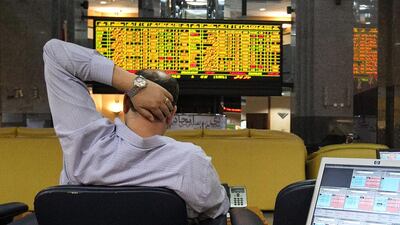UAE equities underwent a severe correction yesterday as profit-taking triggered margin calls and frontier funds exited positions in local companies whose shares are now classified as emerging by MSCI.
The Dubai Financial Market General Index tumbled as much as 6.1 per cent, the biggest intra-day price drop since August 27. The benchmark closed down 5.4 per cent to trade at 4,855.50 points. The Abu Dhabi Securities Exchange General Index fell 2.3 per cent to 4,869.57.
The two biggest stock brokerage firms by traded value, Al Ramz Securities and Mena Corp, said they had obtained new clients from brokerages not licensed to offer margin accounts who are providing leverage beyond the one-to-one ratio allowed by the regulator – resulting in forced sales within the same day in order for their books to appear clean.
This practice of providing credit with a settlement date of T+0 has exposed clients to increased volatility in the market. Typically trades are settled at T+2 in the UAE. Margin trading is the practice of borrowing money to buy securities which can amplify losses as well as gains.
However, the higher amounts of leverage in the market will help trigger a broader sell-off as investors are obliged to close or invest more funds in their positions once they decrease in value past a certain point.
Shares started falling on the Dubai market shortly after the open yesterday, hitting its low around half an hour before the close, after which it recovered slightly. Financial stocks were the biggest fallers.
“From an ethical point of view they are putting their clients at risk. It’s bad for the reputation of the industry and it’s not healthy for the markets either,” said Mohammad Al Dandashi, the managing director at Abu Dhabi’s Al Ramz Securities, which traded Dh9.38 billion last month on the DFM.
Nabil Al Rantisi, Mena Corp’s managing director of brokerage, said that “highly leveraged portfolios with entities [not licensed to offer margin trading] are triggering the sell-off.”
The market regulator SCA could not be reached for comment yesterday.
MSCI, whose indexes are tracked by investors managing about US$8 trillion in assets, has released a final list of UAE shares that will be incorporated into its Emerging Markets Index next month.
Those stocks were not immune from the sell-off yesterday.
“Fund managers that base their portfolios on MSCI’s frontier index are exiting stocks after the upgrade to emerging – because they can’t keep stocks classified as emerging market because their mandate is frontier,” said Nabil Farhat, a partner at Abu Dhabi’s Al Fajer Securities.
In Dubai, Emaar Properties dropped 6.3 per cent to Dh9.60 a share. Arabtec Holding, the construction heavyweight, fell 6 per cent to Dh6.83 a share.
Dubai Islamic Bank, the oldest Sharia-compliant lender, declined 6.1 per cent to Dh7.14 a share. Dubai Financial Market Company, the listed shares of the stock exchange, lost 6.9 per cent to Dh3.35 each.
On the Nasdaq Dubai exchange, the ports operator DP World fell 1.5 per cent to US$19.65 a share.
On the ADX, Aldar Properties declined 2.3 per cent to Dh3.82 a share.
The DFM General Index is up 44 per cent so far this year, while the ADX General Index is up 13.5 per cent in the same period.
“Stocks have quadrupled in value, and there’s high price to earning ratios and no new money coming into the market,” Mr Al Rantisi said. “First quarter results are OK but not great. They don’t match the performance of stocks.”
“MSCI has been discounted heavily. There’s no catalyst. Why would the market go up from here? Sell in May and go away,” he added.
Fund managers say the correction gives room to buy stocks at cheaper valuations and that it does not affect the broader economic outlook of the UAE.
“It’ll give opportunities to buy into assets from investors who have been on the sidelines,” said Saleem Khokhar, the head of equities at National Bank of Abu Dhabi. “I have been telling people a long time that a 10 per cent or 15 per cent correction over a week or two wouldn’t surprise me.”
halsayegh@thenational.ae
Follow us on Twitter @Ind_Insights

